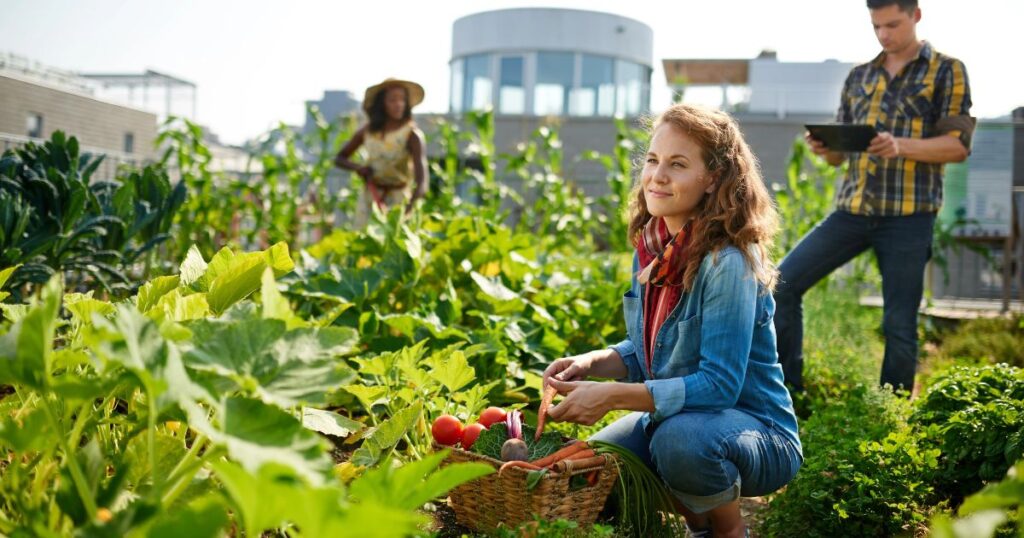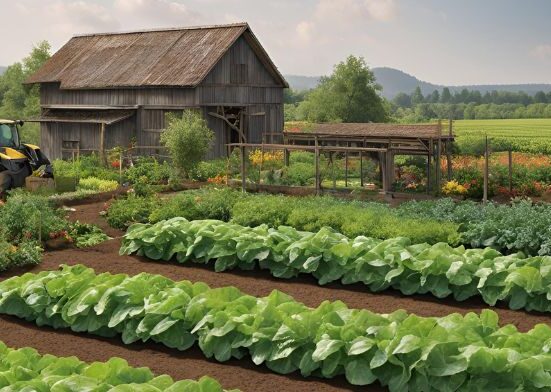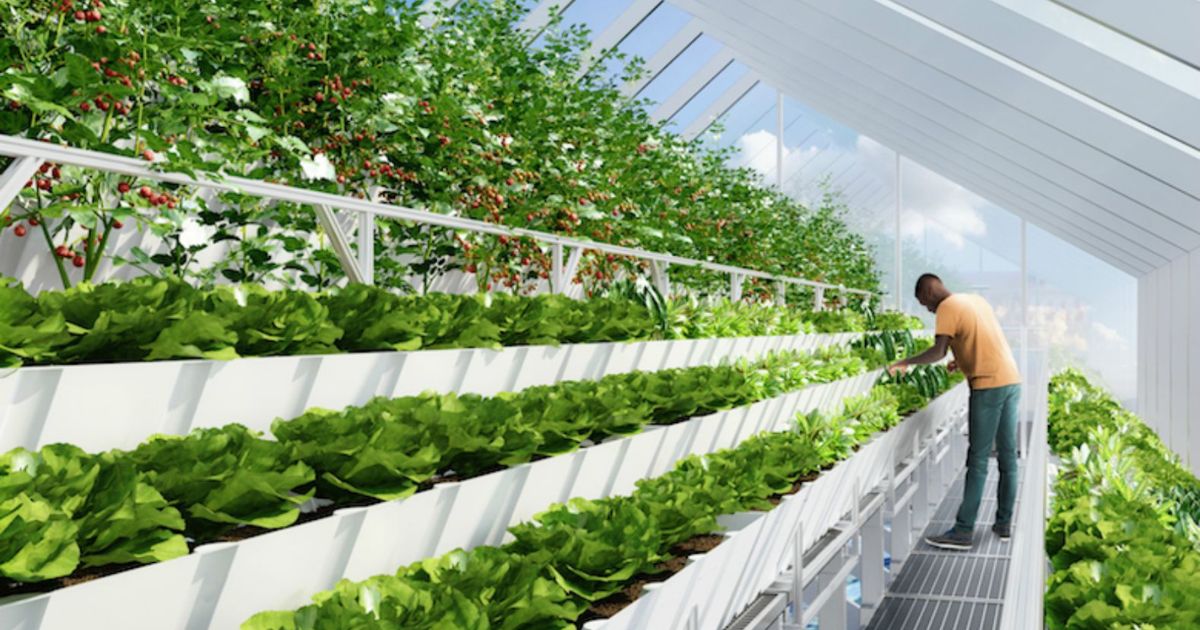The Agricultural sector has faced numerous challenges recently, from soil degradation to climate change and food security issues. Traditional farming methods, which rely heavily on chemical fertilizers, pesticides, and intensive water use, contribute to environmental pollution and long-term damage to ecosystems. As awareness of these challenges grows, organic, eco-friendly farming has emerged as a viable and sustainable alternative. This farming method helps protect the environment, promote healthier production, and promote eco friendly farm equipment biodiversity.
What is Organic Eco-Friendly Farming?
Organic, eco-friendly farming is a holistic approach to agriculture that prioritizes environmental sustainability, soil health, and natural biodiversity. Unlike conventional farming, which relies on synthetic inputs, organic farming uses natural composts, crop rotation, cover crops, and biological pest control methods. The primary objective is to balance the ecosystem while producing nutritious and chemical-free food. Eco-friendly farming goes further by incorporating conservation practices, minimizing water wastage, reducing carbon footprints, and adopting renewable energy sources. Combining organic principles and eco-conscious practices makes this approach a leading solution for sustainable eco-friendly farming agriculture.
The Benefits of Organic Eco-Friendly Farming

Organic, eco-friendly farming focuses on sustainable practices that benefit the environment, human health, and local economies. Avoiding synthetic pesticides and fertilizers minimizes soil degradation and water contamination. Organic farming promotes biodiversity by encouraging crop rotation and natural pest control, which reduces the need for harmful chemicals. This method also helps preserve pollinators like bees and butterflies. In addition, organic products are free from harmful additives, making them healthier for consumers. It supports local farmers by reducing dependence on large-scale industrial farming and encourages fair trade practices. Organic agriculture helps mitigate climate change by improving soil health and storing carbon. By prioritizing sustainability, organic, eco-friendly farming provides long-term solutions for a healthier planet and a more resilient food system.
Environmental Sustainability
Environmental sustainability refers to responsible interaction with the planet to maintain natural resources and ecosystems for future generations. It involves reducing pollution, conserving biodiversity, and minimizing waste while promoting renewable energy and sustainable practices. By adopting eco-friendly habits, such as recycling, reducing carbon footprints, and protecting wildlife, individuals and businesses can help mitigate climate change and environmental degradation. Governments and organizations play a crucial role in implementing policies that encourage sustainable development. The goal is to balance economic growth, social well-being, and environmental health, ensuring that human activities do not compromise the Earth’s ability to support life.
Healthier Food Production
Healthier Food Production focuses on sustainable, nutritious, and safe food cultivation methods. It emphasizes organic farming, reduced chemical use, and environmentally friendly practices to enhance food quality and human health. This approach includes regenerative agriculture, ethical sourcing, and minimizing food processing to retain natural nutrients. By promoting locally sourced, fresh ingredients and reducing preservatives, healthier food production supports a balanced diet while protecting ecosystems. It ensures food safety, reduces waste, and fosters a healthier future for both people and the planet.
Preservation of Soil Health
Soil health is crucial for sustainable agriculture. Practices such as crop rotation, composting, and reduced tillage help maintain soil fertility, prevent erosion, and support biodiversity. Healthy soil leads to better crop yields and long-term agricultural success. Water conservation involves strategies to reduce water waste and ensure efficient use of this vital resource. Techniques like rainwater harvesting, drip irrigation, and reducing industrial water consumption help protect freshwater supplies and ensure sustainability for future generations.
Reduction in Greenhouse Gas Emissions
Organic farming significantly reduces carbon footprints by eliminating synthetic chemical production and utilizing carbon sequestration methods such as agroforestry and cover cropping. This practice helps combat climate change and global warming. Organic farming supports various plant and animal species by avoiding genetically modified organisms (GMOs) and chemical inputs. Companion planting, natural pest control, and habitat conservation contribute to a balanced ecosystem supporting pollinators like bees and eco friendly farming techniques butterflies.
Economic Viability and Farmer Benefits
Although transitioning to organic farming requires initial investments, it offers long-term financial benefits. Due to growing consumer demand, organic produce often fetches higher market prices. Additionally, reduced dependency on synthetic inputs lowers farming costs, leading to more significant profit margins for why vertical farming is not eco friendly farmers.
Essential Techniques in Organic Eco-Friendly Farming

Essential Techniques in Organic Eco-Friendly Farming” highlights the key practices that promote sustainability and environmental stewardship. Organic farming emphasizes using natural methods to grow crops, such as crop rotation, companion planting, and organic fertilizers like compost and manure. Integrated pest management (IPM) is vital, using beneficial insects, traps, and non-toxic treatments to control pests. Soil health is prioritized through mulching, cover cropping, and reduced tillage, which prevent soil erosion and maintain biodiversity. Organic farmers also avoid synthetic pesticides and fertilizers, relying instead on ecological principles to enhance resilience. By fostering a balanced ecosystem, organic farming reduces environmental impact and promotes healthier food production, ensuring long-term agricultural Saltwater Farming sustainability.
Crop Rotation and Companion Planting
Crop rotation and companion planting are essential techniques in sustainable gardening and agriculture. Crop rotation involves changing the types of crops grown in a specific area each season to maintain soil health, reduce pests, and prevent nutrient depletion. By rotating crops like legumes, leafy greens, and root vegetables, farmers can naturally replenish soil nutrients and minimize the risk of plant diseases. Companion planting, on the other hand, involves strategically growing different plant species together to enhance growth, deter pests, and improve yields. For example, planting basil alongside tomatoes can enhance flavor and repel insects, while marigolds help protect various crops from harmful pests.
Use of Organic Fertilizers and Composting
Organic farmers enrich the soil with compost, manure, and green cover crops. Composting decomposed organic matter returns essential nutrients to the earth and improves soil structure, making it more resilient against drought and eco friendly fish farming erosion.
Natural Pest and Weed Control
Instead of using chemical pesticides, organic farmers implement integrated pest management (IPM) techniques. These include introducing beneficial insects like ladybugs, using neem oil, and planting pest-repelling herbs. Mulching and cover cropping help suppress weeds while preserving soil moisture.
Water-Efficient Irrigation Systems
Drip irrigation and rainwater harvesting reduce water wastage by delivering moisture directly to plant roots. These methods are particularly effective in arid regions where water conservation is crucial for sustainable is organic farming eco-friendly agriculture.
Agroforestry and Permaculture Practices
Integrating trees and shrubs into farming systems enhances biodiversity, prevents soil erosion, and improves carbon sequestration. Permaculture principles emphasize designing self-sustaining ecosystems that mimic nature and require minimal human intervention. Plowing and excessive tilling disturb soil microbes and lead to erosion. Organic farmers adopt no-till or minimal tillage practices to retain soil structure, enhance microbial activity, and preserve moisture levels.
Challenges of Organic Eco-Friendly Farming

Organic, eco-friendly farming faces several challenges despite its environmental benefits. One major hurdle is the lower yield compared to conventional agriculture, which can make it less economically viable, especially for large-scale production. This results in higher costs for consumers. Additionally, organic farmers often struggle with pests and diseases, as they cannot rely on synthetic pesticides and fertilizers, requiring alternative methods like crop rotation and natural predators, which can be labor-intensive. Soil fertility is another concern, as organic farming demands more attention to maintaining healthy soil through composting and cover crops. Weather variability and climate change further complicate farming practices, with organic farms being more vulnerable due to the reduced use of synthetic chemicals. Lastly, market access and certification costs can hinder small-scale farmers from thriving in the organic sector. Despite its numerous benefits, organic farming faces several challenges:
Higher Initial Costs
Transitioning from conventional to organic farming requires soil improvement, organic certification, and sustainable infrastructure investment. However, long-term savings and premium market prices for organic products often offset these drip irrigation costs.
Yield Variability
Organic farms sometimes produce lower initial yields than conventional farms due to the absence of synthetic fertilizers. However, yields become stable and comparable to traditional farming as soil health improves.
Labor Intensity
Organic farming requires more manual labor for weeding, composting, and pest management. This can increase operational costs and create employment opportunities in rural areas. Obtaining organic certification can be complex and expensive, especially for small-scale farmers. Additionally, organic produce faces stiff competition from conventionally grown food in terms of pricing and accessibility.
Technological Advancements in Organic Farming
- Precision Agriculture: Drones and AI-driven monitoring systems help optimize resource use and detect plant health issues early.
- Biological Innovations: Advances in bio-fertilizers, natural pest control, and soil-enhancing microbes contribute to sustainable farming.
- Blockchain in Agriculture: Blockchain technology can improve transparency in organic food production, ensuring fair trade and authenticity.
Consumer Awareness and Demand
With growing awareness of organic food’s environmental and health benefits, consumer demand is driving a shift towards more sustainable farming practices. Supermarkets and online marketplaces are expanding their organic product offerings, making it easier for consumers to make eco-friendly choices. Many countries are introducing policies and subsidies to promote organic agriculture. Initiatives such as the European Green Deal and the U.S. Organic Certification Cost Share Program are helping farmers transition to sustainable practices.
Environmental Benefits of Organic Farming
Organic farming offers several environmental benefits, primarily by promoting biodiversity and reducing pollution. Unlike conventional agriculture, which relies on synthetic chemicals, organic methods use natural fertilizers and pest control techniques, reducing the risk of harmful runoff into water systems. This approach helps preserve soil health by encouraging crop rotation and composting, which improves soil structure and nutrient content. Organic farms also use fewer fossil fuels, as they rely on manual or low-energy techniques instead of heavy machinery. By minimizing pesticide use, organic farming protects local wildlife, including pollinators like bees, which are essential for crop production. Organic farming fosters a healthier ecosystem, reduces greenhouse gas emissions, and contributes to long-term sustainability.
Reduced Soil Degradation and Erosion
Soil degradation and erosion are significant environmental challenges, often caused by unsustainable agricultural practices, deforestation, and urbanization. By adopting more responsible land management techniques such as crop rotation, agroforestry, and no-till farming, we can significantly reduce the erosion of fertile soil. These methods help maintain the integrity of the soil structure, promote soil fertility, and prevent the loss of valuable topsoil, ultimately leading to healthier ecosystems and more sustainable agricultural practices.
Water Conservation and Pollution Reduction
Water is a vital resource, yet many regions face scarcity due to inefficient use and pollution. Water-saving techniques such as drip irrigation, rainwater harvesting, and water-efficient crops can significantly reduce water wastage. Reducing pollution through proper waste management, sustainable agriculture practices, and eco-friendly chemicals can help protect water bodies, leading to cleaner water sources and ensuring water availability for future generations.
Lower Carbon Footprint and Climate Change Mitigation
Human activities contribute significantly to greenhouse gas emissions, particularly in the industrial, energy, and transportation sectors. Reducing carbon emissions is essential in the fight against climate change. This can be achieved by shifting towards renewable energy sources, promoting energy efficiency, reducing waste, and adopting sustainable transportation options. Additionally, reforestation, regenerative agriculture, and reducing fossil fuel dependence can further reduce our carbon footprint and mitigate the adverse effects of climate change.
Enhancement of Biodiversity

Biodiversity is essential for ecosystem stability and resilience, providing a wide range of ecosystem services such as pollination, pest control, and soil fertility. However, the loss of biodiversity is a growing concern due to habitat destruction, pollution, and climate change. Protecting natural habitats, restoring degraded ecosystems, and creating wildlife corridors can help preserve and enhance biodiversity. Supporting sustainable agriculture, forest management, and marine conservation also protects species diversity, ensuring that ecosystems remain balanced and capable of supporting life in all its forms.
Economic and Social Impact
Organic, eco-friendly farming plays a significant role in reshaping the agricultural landscape. Economically, it creates opportunities for local economies by supporting small-scale farmers, increasing demand for organic products, and boosting green jobs. Farming also promotes biodiversity, contributing to healthier ecosystems and increased resilience to climate change. Socially, organic farming promotes a healthier lifestyle by offering consumers food free from synthetic pesticides and fertilizers. It also empowers farmers by giving them the tools to produce sustainably while encouraging stronger community connections around food systems.
The Future of Organic Eco-Friendly Farming:
The future of organic, eco-friendly farming looks promising as consumers continue to push for more transparency in food production and a greater emphasis on sustainability. Advancements in technology, such as precision agriculture, will allow organic farmers to be more efficient while maintaining their eco-friendly practices. As awareness of environmental concerns such as climate change, soil depletion, and biodiversity loss grows, organic farming’s role in mitigating these issues will become even more crucial. Additionally, increasing governmental support and certification programs will help to expand organic agriculture on a global scale.
Trends and Innovations in Sustainable Agriculture

Sustainable agriculture is evolving, and several innovative trends are making an impact. The rise of agroecology, which blends traditional farming knowledge with modern science, is gaining traction. Innovations in plant breeding, such as developing drought-resistant and pest-resistant crops, enhance productivity without harmful chemicals. Vertical farming, aquaponics, and hydroponics offer solutions to grow food efficiently in urban spaces, reducing transportation costs and carbon footprints. Developing plant-based proteins and lab-grown meat alternatives also reshapes the agricultural industry, supporting sustainable food production with lower environmental costs.
Conclusion:
Organic, eco-friendly farming represents the future of sustainable agriculture. By adopting natural and environmentally responsible techniques, farmers can produce healthy, chemical-free food while preserving biodiversity and reducing their carbon footprint. Although challenges exist, ongoing technological advancements, policy support, and consumer demand drive the global shift toward greener agricultural practices. As individuals, choosing organic products and supporting sustainable farming initiatives can contribute to a healthier planet and a more secure food future for generations to come.
FAQ:
What is Eco-friendly Farming?
Eco-friendly farming, also known as sustainable farming, is a method of agriculture that focuses on growing food and raising livestock while minimizing environmental harm. It incorporates practices that protect natural resources, preserve biodiversity, and reduce pollution while maintaining productivity.
Why is Eco-friendly Farming Important?
Eco-friendly farming is crucial for ensuring the long-term health of the planet. It helps reduce the depletion of natural resources like water and soil, prevents pollution from pesticides and fertilizers, and supports biodiversity. This type of farming contributes to combating climate change by reducing greenhouse gas emissions and promoting healthier ecosystems.
How does Eco-friendly Farming Reduce Environmental Impact?
Eco-friendly farming conserves water, reduces soil erosion, and minimizes chemical use. Practices like crop rotation, composting, agroforestry, and integrated pest management help restore and maintain soil health, reduce chemical runoff, and promote natural pest control. These methods are less harmful to wildlife and the environment than conventional farming.
What are the Benefits of Eco-friendly Farming for Consumers?
Eco-friendly farming benefits consumers through healthier food options, as these practices tend to produce food with fewer pesticides and chemicals. It also supports local economies by promoting small-scale, diversified farms and helps ensure food security by focusing on long-term sustainability.
How Can Eco-Friendly Farming Help Combat Climate Change?
Eco-friendly farming practices contribute to climate change mitigation by sequestering carbon in the soil, reducing the need for synthetic fertilizers (which are energy-intensive to produce), and using renewable energy sources. Practices such as agroforestry and conservation tillage also help store carbon, lowering agriculture’s overall carbon footprint.







